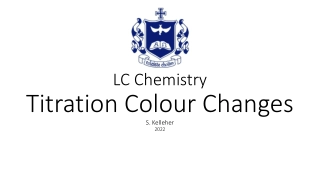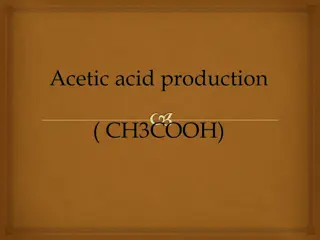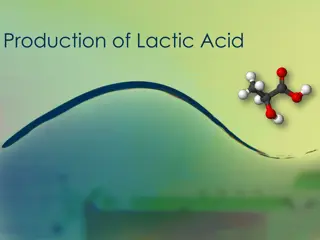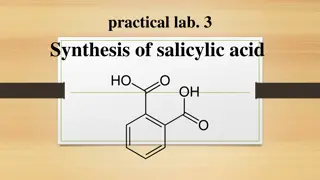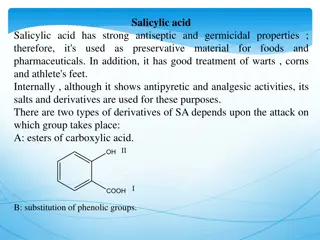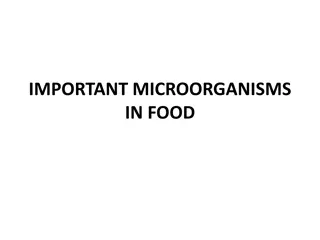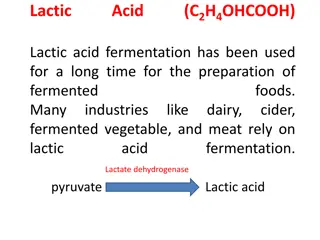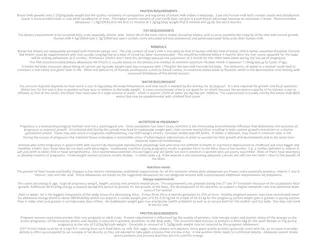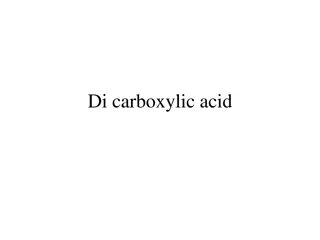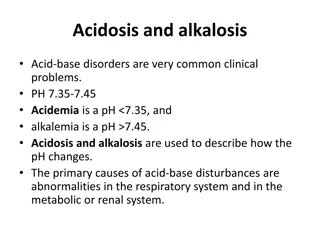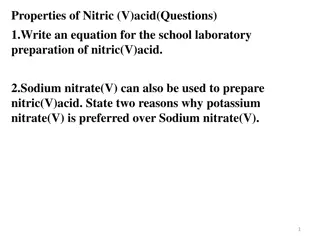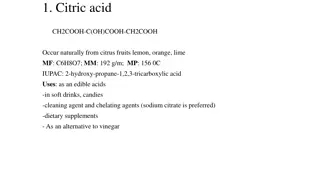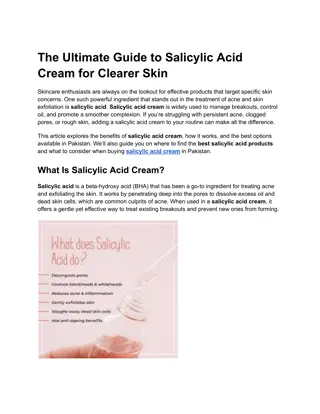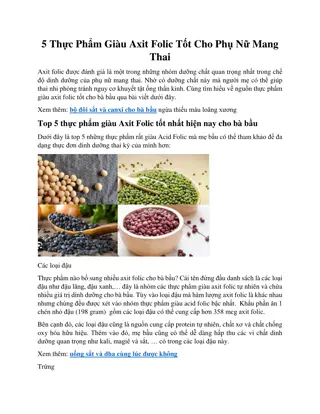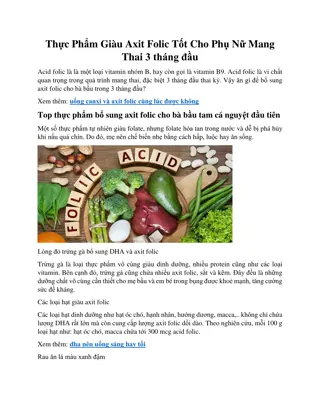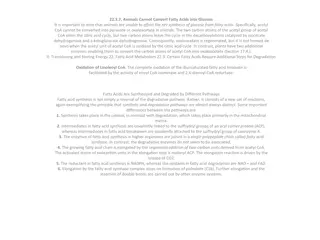Titration Colour Changes
This collection features various experiments in chemistry involving titration and solutions. It includes procedures such as standardizing hydrochloric acid using sodium carbonate, titrating hydrochloric acid with sodium hydroxide to produce sodium chloride, determining the concentration of ethanoic
0 views • 10 slides
Evidence on Multiple Micronutrient Supplementation for Maternal Health
Multiple Micronutrient Supplementation (MMS) offers significant benefits compared to Iron and Folic Acid (IFA) for pregnant and nursing women. UNIMMAP MMS contains 15 essential vitamins and minerals, meeting requirements poor diets cannot fulfill. Research supports the effectiveness and safety of MM
3 views • 21 slides
Addressing Anemia Among Pregnant Women in Meerut District
Anemia is a prevalent condition among pregnant women in Meerut, India. The Anemia Mukt Bharat program aims to reduce anemia rates by providing iron and folic acid supplements through ANC services. Data analysis shows progress in ANC registration and iron tablet consumption, highlighting the importan
0 views • 11 slides
Best Acetic Acid Glacial Manufacturer Company - Modi Chemical
Modi Chemical stands out as the premier acetic acid glacial manufacturer, dedicated to delivering top-notch quality and unmatched customer service. With a strong focus on sustainability and innovation, Modi Chemical has become the go-to source for high-purity acetic acid glacial, catering to a wide
2 views • 1 slides
M-TOLUIC ACID Manufacturer in Gujarat - Modi Chemical
Modi Chemical is the top m-toluic acid manufacturer in Gujarat, renowned for delivering high-quality, pure m-toluic acid. Our state-of-the-art facilities and stringent quality control ensure exceptional product consistency and reliability. Committed to sustainability and innovation, we serve a wide
0 views • 1 slides
Industrial Production of Citric Acid and Microbial Fermentation
Industrial production of citric acid has evolved from extraction processes to microbial fermentation, offering various industrial applications. Citric acid is utilized as an acidulant in food and pharmaceutical industries, a chelating agent in tanning, and a flavor enhancer in carbonated beverages.
1 views • 18 slides
Industrial Production of Citric Acid: Fermentation Processes and Applications
Citric acid is industrially produced through microbial fermentation processes. It is widely used in various industries such as food, pharmaceuticals, and beverage production. Different methods like surface culture fermentation are employed for citric acid manufacture, with fungi like Aspergillus nig
4 views • 18 slides
Limit Test of Iron Based on Color Reaction with Thioglycollic Acid
The limit test for iron involves the reaction of iron in ammoniacal solution with citric acid and thioglycollic acid to form a reddish-purple color. By comparing the color produced with a standard solution, the presence of iron is determined. Citric acid prevents precipitation of iron, while thiogly
1 views • 5 slides
Understanding the Impact of Acid Rain on Ecosystems
Investigate the effects of acid rain caused by fossil fuel combustion on water acidity, plant life, animals, and structures. Learn how nitrogen oxides and sulfur dioxide create acid solutions in the atmosphere, affecting watersheds and sensitive ecosystems. Explore the devastating consequences of ac
1 views • 20 slides
Determination of Acetic Acid Content in Vinegar Experiment
The experiment aims to measure the total acid concentration in a specific brand of vinegar through a titration process using NaOH solution. The procedure involves titrating the vinegar solution with NaOH until a pink color appears, calculating the concentration of acetic acid, and determining the pe
3 views • 8 slides
The Production and Uses of Acetic Acid: From Ancient Practices to Modern Applications
The production of acetic acid, specifically in the form of vinegar, has a long history dating back to ancient times. Vinegar was utilized for various purposes such as a food condiment, treating wounds, and addressing different illnesses. Today, acetic acid is mainly used in the food industry for con
1 views • 17 slides
Overview of Lactic Acid Production and Applications
Lactic acid occurs in two isomeric forms and has various applications in food, pharmaceuticals, and skincare industries. It is primarily produced through the fermentation of sugars by microorganisms. The production process involves using raw materials like purified sugars and agricultural wastes. Th
4 views • 11 slides
Understanding Enzyme Catalysis and Active Site Role
Enzymes play a crucial role in catalyzing biochemical reactions by stabilizing transition states through their active sites. Different mechanisms like acid-base, covalent, metal, and electrostatic interactions are employed for stabilization. Acid-base catalysis involves acceleration without being co
1 views • 21 slides
Annual Coeliac Review Mini Video Series: Symptoms, CDAT, and Support
Discover the annual Coeliac review mini video series that covers topics like symptoms of Coeliac Disease, Calcium and Vitamin D needs, Folic Acid, Vitamin B12, Iron levels, labelling, cross-contamination awareness, and more. Learn about the varied symptoms of Coeliac Disease, the impact on gut villi
0 views • 6 slides
Synthesis of Salicylic Acid: Theory, Derivatives, and Applications
Salicylic acid is synthesized from methyl salicylate through ester hydrolysis with aqueous alkali. It is a versatile compound used in organic synthesis, as a plant hormone, and derived from salicin metabolism. The derivatives of salicylic acid can minimize gastric disturbances and enhance therapeuti
4 views • 12 slides
Maternal Nutrition Guidelines for Optimal Health Before and During Pregnancy
Recommended maternal nutrition practices play a crucial role in preventing nutrition deficiencies in both mothers and infants, improving fetal outcomes, and reducing morbidity and mortality rates. Preconception care emphasizes the provision of health interventions to women and couples before concept
0 views • 14 slides
Overview of Salicylic Acid and its Derivatives
Salicylic acid is known for its antiseptic, germicidal, and analgesic properties, used in various applications such as preservatives, wart treatments, and pain relief. Different derivatives of salicylic acid are developed to minimize side effects and enhance efficacy. Acetyl salicylic acid (ASA), co
0 views • 15 slides
Sulfonamides: History, Chemistry, and Mechanism of Action
Sulfonamides, the first effective antimicrobial agents against bacterial infections, have a rich history and chemistry rooted in sulphanilamide derivatives. Their mechanism of action involves inhibiting folic acid synthesis through competitive antagonism and sequential blocking with diaminopyrimidin
0 views • 27 slides
Managing Migraine and Anticonvulsants in Pregnancy: Clinical Guidance
Learn how to effectively manage migraine headaches and administer anticonvulsants during pregnancy, with insights into symptom recognition, prophylactic treatments, medication safety, and counseling on endocrine disorders like diabetes mellitus and thyroid diseases. Stay informed on teratogenic effe
0 views • 68 slides
Important Bacterial Groups in Food
Bacteria play a crucial role in food, with various groups such as Lactic Acid Bacteria, Acetic Acid Bacteria, Propionic Acid Bacteria, Butyric Acid Bacteria, Proteolytic Bacteria, Lipolytic Bacteria, Saccharolytic Bacteria, and Pectinolytic Bacteria identified for their specific roles in food fermen
0 views • 17 slides
Lactic Acid Fermentation in Food Industry
Lactic acid fermentation is a widely used method for producing fermented foods like dairy, vegetables, and meats. This process involves lactic acid bacteria and filamentous fungi to convert sugars into lactic acid. Various microbial cultures are utilized, and raw materials such as whey, molasses, an
0 views • 23 slides
Understanding Purine Degradation and Gout
Purine degradation pathway involves the breakdown of dietary nucleic acids, mainly from meat, into uric acid through specific enzymatic steps. Excessive uric acid production can lead to conditions like gout and hyperuricemia. Humans excrete uric acid in the urine as the final product, while other an
1 views • 12 slides
Understanding Acid-Base Balance and Regulation in the Body
Acid-base balance is crucial for maintaining optimal physiological functions. This content explains the definitions of acids and bases, differentiates between strong and weak varieties, explores the significance of pH control in body fluids, and delves into the roles of buffers, kidneys, and lungs i
0 views • 20 slides
Understanding Birth Defects: An Overview of Congenital Anomalies
Birth defects refer to abnormalities present in babies at birth, regardless of genetic or prenatal causes. They affect 2-3% of babies in the US, making them a leading cause of infant mortality. Structural defects like cleft lip/palate, spina bifida, and club foot can impact a child's health and deve
0 views • 17 slides
Nutritional Requirements for Infants, Breastfeeding, and Pregnancy
Breast milk powder provides adequate protein for infants, while cow and human milk have varying qualities. Essential fatty acids are crucial for skin integrity and growth, and infants may need iron supplementation if formula-fed. Pregnancy nutrition is vital for fetal development, with deficiencies
0 views • 5 slides
Understanding Folate: Structure, Sources, and Bioavailability
Folate, also known as vitamin B9, plays a crucial role in various bodily functions. Folic acid and folate are different forms of the vitamin, with distinct sources and structures. Good food sources of folate include green vegetables, legumes, fruits, and fortified products. The bioavailability of fo
0 views • 24 slides
Exploring Leaves: From FOLI to Unifoliate
Delve into the world of leaves, from the beautiful FOLIage of plants to the use of defoliants and folio in literature. Discover the significance of bifoliate orchids, the importance of folic acid, and the art of exfoliating leaves. Explore the diverse meanings and applications of leaves in various c
0 views • 11 slides
Understanding DiCarboxylic Acid: Properties, Preparation, and Uses
DiCarboxylic acid is an organic compound containing two carboxyl functional groups. Focus on Oxalic acid, its physical and chemical properties, preparation methods, and various applications including as a cleaning agent, in industrial processes, and potential medicinal uses. Learn about the unique c
0 views • 10 slides
Entomophagy and the Nutritional Benefits of Eating Grasshoppers
The International Conference on Food Technology delved into the practice of entomophagy, focusing on the consumption of grasshoppers. With over 80 edible species of grasshoppers globally, they provide essential nutrients such as proteins, fats, vitamins, and minerals. Grasshoppers are known for thei
0 views • 11 slides
Understanding Acidosis and Alkalosis in Acid-Base Disorders
Acid-base disorders, involving acidosis and alkalosis, are common in clinical practice. These conditions are characterized by changes in pH levels, with acidemia (pH < 7.35) and alkalemia (pH > 7.45) representing acidosis and alkalosis, respectively. The primary causes of these imbalances lie within
0 views • 17 slides
Laboratory Preparation of Nitric(V) Acid & Chemical Reactions
In this set of questions, we explore the preparation of nitric(V) acid in a school laboratory setting, its properties, and chemical reactions. Topics covered include the use of sodium nitrate(V) and potassium nitrate(V), the use of glass apparatus during the preparation process, color changes in con
0 views • 4 slides
Understanding Acid Rain and Its Environmental Impact
Exploring the phenomenon of acid rain, this activity investigates the effects of fossil fuel emissions on water acidity. By using a pH-meter sensor, participants create hypotheses and conduct experiments to understand what determines the pH of acid rain. Theoretical insights reveal how nitrogen oxid
1 views • 20 slides
Common Organic Acids and Their Uses in Various Industries
Citric acid, lactic acid, salicylic acid, and tartaric acid are natural acids found in various fruits. They have diverse applications in food and beverage, pharmaceutical, and cosmetic industries. These acids are used for flavoring, cleaning, as food additives, and in the preparation of various prod
0 views • 4 slides
Equilibrium and Acid-Base Problems in Chemistry Lecture
In this lecture, topics such as Advanced Equilibrium, Acid/Base Equilibria, Systematic Method for solving chemical problems, Strong Acid/Strong Base scenarios, and General Comments on reactions are discussed. Examples using the systematic method are provided for practical understanding. Key points o
0 views • 13 slides
The Ultimate Guide to Salicylic Acid Cream for Clearer Skin
This article explores the benefits of salicylic acid cream, how it works, and the best options available in Pakistan. We\u2019ll also guide you on where to find the best salicylic acid products and what to consider when buying salicylic acid cream in
0 views • 4 slides
Top 5 Salicylic Acid Body Washes for Clear Skin
Salicylic acid, a powerful beta hydroxy acid (BHA), is known for its remarkable ability to fight acne and improve skin texture. As an ingredient commonly found in skincare products, salicylic acid body washes are particularly effective for treating b
0 views • 4 slides
Understanding Serum Uric Acid Levels and Hyperuricemia
Serum uric acid is a crucial marker of purine metabolism, with elevated levels indicating hyperuricemia which can lead to conditions like Gout. The measurement of serum uric acid helps in diagnosing hyperuricemia, with serum being the preferred specimen for testing. Various factors such as diet, gen
0 views • 12 slides
5 Thực Phẩm Giàu Axit Folic Tốt Cho Phụ Nữ Mang Thai
Axit folic l\u00e0 d\u01b0\u1ee1ng ch\u1ea5t c\u1ea7n \u0111\u1eb7c bi\u1ec7t ch\u00fa tr\u1ecdng b\u1ed5 sung ngay t\u1eeb khi d\u1ef1 \u0111\u1ecbnh c\u00f3 thai. C\u00f9ng t\u00ecm hi\u1ec3u v\u1ec1 ngu\u1ed3n th\u1ef1c ph\u1ea9m gi\u00e0u axit fo
0 views • 3 slides
Thực Phẩm Giàu Axit Folic Tốt Cho Phụ Nữ Mang Thai 3 tháng đầu
Axit folic l\u00e0 d\u1ea1ng kho\u00e1ng ch\u1ea5t c\u00f3 th\u1ec3 h\u00f2a tan trong n\u01b0\u1edbc. \u0102n g\u00ec \u0111\u1ec3 b\u1ed5 sung axit folic cho b\u00e0 b\u1ea7u trong 3 th\u00e1ng \u0111\u1ea7u?
0 views • 3 slides
Understanding Fatty Acid Metabolism in Animals
Animals cannot convert fatty acids into glucose due to the inability to synthesize glucose from fatty acids. The process involves acetyl-CoA not being converted into pyruvate or oxaloacetate, leading to the citric acid cycle and differences between fatty acid synthesis and degradation pathways. Key
0 views • 8 slides
